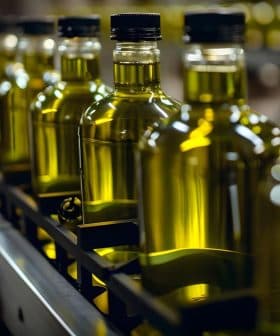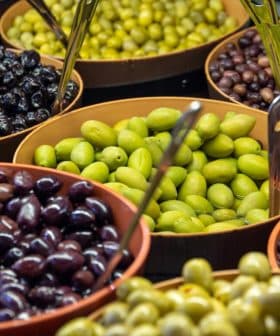 7.0K reads
7.0K readsBusiness
Tunisia Takes Measures to Lower Olive Oil Prices at Home as Export Revenues Fall

Tunisia’s olive oil revenue has declined due to the majority of locally produced oil being exported at a low fixed price to the European Union. In response to rising domestic olive oil prices, the Tunisian government has announced plans to offer a preferential price for olive oil in the local market to support consumers facing economic challenges.
Tunisia’s olive oil revenue has declined, according to TNI, an international research institute. Farmers are producing less olive oil due to climatic conditions, and most of the oil produced is exported abroad at a cheap fixed price of €1.85 per liter.
As part of its partnership agreement with the European Union, Tunisia exports 90 percent of locally produced bulk olive oil to the 27-member bloc, leaving only 10 percent for domestic consumption.
These are patterns that have emerged in past colonies. E.U. buyers blend Tunisian oils with other oils and bottle it. Most consumers aren’t aware that these blends are overwhelmingly Tunisian.
The cooperation agreement signed by the E.U. with the North African country allows Tunisia to export up to 56,700 tons of duty-free olive oil to E.U. member states annually. In the process, Tunisia has lost out on significant added value.
“The dominant trade system in Tunisia is a bulk system, where the majority of olive oil is exported to the E.U. at a cheap commodity price,” Sarah Ben Romdane, founder of KAÏA, told Olive Oil Times.
See Also:Tunisia Has a Plan to Boost Its Olive Oil Industry“These are patterns that have emerged in past colonies,” she added. “E.U. buyers blend Tunisian oils with other oils and bottle it. Most consumers aren’t aware that these blends are overwhelmingly Tunisian. My goal in launching KAÏA was to imagine a new system and challenge the old one.”
Over the past half-decade, Tunisia has yielded an average of 257,000 tons of olive oil per annum.
According to local sources, olive oil production is expected to rebound to 220,000 tons in the 2023/24 crop year, after a disappointing harvest of 180,000 tons in 2022/23.
Indeed, most Tunisian olive oil is exported in bulk to Spain and Italy, blended and then re-exported under Spanish and Italian brands.
Ben Romdane said European producers make healthy profits this way, selling cheap Tunisian olive oil to the detriment of Tunisian farmers, who are forced to contend with lower earnings against the backdrop of rising inflation (at 8.3 percent in November).
“Economically, farmers do not earn enough money, and people in the rural areas do not benefit from the olive oil revenue. Farmers are selling bulk olive oil, and there’s no notion of provenance, terroir, transparency or traceability,” she said. “What I sell is proudly Tunisian. It involves storytelling, branding and packaging and allows me to enter the market through a different route.”
“This is why I have been inspired to create a family legacy, reconnect with my Tunisian roots, and empower Tunisian culture and terroir,” she added.
What Ben Romdane sells is a brand, and gradually, “made in Tunisia” exports are on the rise – some 27,000 tons of oil bottled in Tunisia were shipped across the world in 2020, compared to a mere 400 tons in 2006.
Progress is slow, however. “It is not easy to take that route. It is also not easy to break the pattern of dependence on a formal colonial power,” Ben Romdane said. “If you don’t have a French passport, you don’t have the ease to travel, attend trade shows and meet potential clients.”
“It’s also a matter of being able to speak English and French, as well as visa privileges, ease travel. But there is not one way to be a Tunisian,” she added. “Some Tunisians are gradually selling premium olive oil, but it’s still a niche market. Yet, there is a lot of reason to believe in Tunisian olive oil.”
On December 9, 2023, the Tunisian Economic Observatory called for the revision of Tunisia’s annual olive oil export quota. It noted that the current free trade agreement demonstrates an unbalanced relationship between Tunisia and the EU.
“The bulk system has remained because of structural challenges, including the currency, which are difficult to dismantle,” Ben Romdane said. “Moreover, the E.U. doesn’t have an interest in supporting Tunisian-made olive oil.”
“The government has tried to renegotiate the commodity prices in the past,” she added. “The intention is certainly there.”
Recently, the Tunisian government announced plans to offer a preferential price for olive oil in the domestic market of 15 Tunisian dinars (€4.45) per liter to ensure Tunisians are not hurt by lower stocks at home.
In a joint press statement, two of Tunisia’s government bodies, the Ministry of Agriculture, Water Resources and Fisheries and the Ministry of Trade and Commerce, announced that 10,500 tons of extra virgin olive oil would be kept aside for retail sales for consumers in the domestic market.
The oil will be packaged in one-liter bottles and marketed within Tunisia starting December 15th.
The export-focused orientation of the sector means farmers cannot sell much to the local market. Subsequently, the low olive oil supply has raised prices domestically.
In October 2023, the Tunisian minister, Abdelmonem Belati, indicated that the price of olive oil jumped from 15 dinars (€4.53) per kilogram in March 2023 to approximately 25 dinars (€7.54) per kilogram in October, an 80 percent increase.
At the time, Fawzi Al-Zayani, the head of the Union of Tunisian Farmers, estimated that olive oil prices in the domestic market were expected to reach 30 dinars (€9) per kilogram, causing concern for the government of Tunis.
As a result, Tunisian President Kais Saïed intervened by recommending the new preferential price measure.
This sale to the domestic market at a preferential price offers local consumers sufficient quantities of extra virgin olive oil while considering their purchasing power.
Given that the average monthly household income in Tunisia is between 201 and 500 dinars (about €60 to €150) and unemployment reached 16.2 percent in the first quarter of 2023, this measure aims to alleviate the economic burden on citizens.









